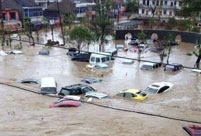China recorded a bumper harvest this year. Yet agricultural problems remain and are clouding the world's most populous country, prompting the government to take measures to beef up food security.
China's grain output this summer, mostly wheat, hit a record high of 132 million tonnes, the National Bureau of Statistics (NBS) said.
The production of maize, harvested in autumn, is expected to hit a record high of 215 million tonnes, according to the State Administration of Grain (SAG).
The country's grain output rose 3.2 percent year on year to hit 589.57 million tonnes in 2012, marking the ninth consecutive year of growth, according to NBS data.H Despite the record harvests, China's agriculture faces chronic problems.
The amount of arable land is shrinking amid the country's urbanization drive. There is water and land pollution due to excessive use of pesticides and fertilizers. Also, there is a large amount of waste in the way grain is stored, experts argue.
This year's World Food Day, which falls on Wednesday, will be themed "sustainable food systems for food security and nutrition".
Echoing the UN Food and Agriculture Organization focus, the Chinese government has vowed to ensure national food security and effective supply of farm produce.
At a central economic work conference in December, issues involving agriculture, farmers and rural areas were emphasized as a top priority for the Communist Party of China. Issues should never be neglected in spite of bumper grain harvests for several consecutive years, according to a statement issued after the conference.
Agricultural experts point out that to fulfill sustainable food security systems, not only sufficient grain production is needed but also sound protection of resources like land and water.
For Wang Cigen and many of his peers in the village of Hexin in Wuhu City, east China's Anhui Province, environmental protection is at the forefront of their work.
Rather than discard pesticide packages casually as he used to do, Wang now puts them in a green dustbin near his farmland.
The village committee has provided 200 such bins for farmers to use when disposing of pesticide garbage. The rubbish is then sent to Wuhu for processing and incineration.
Over the past year, the village has collected more than 300,000 pesticide bottles and bags thanks to the pilot program initiated by Anhui provincial authorities.
Excessive use of fertilizer is another major concern.
Starting from 2005, Chinese agricultural authorities began providing free soil testing for 190 million farmer households each year. It gave them fertilizer recommendations based on the results.
The move has improved fertilizer efficiency, lowered consumption and boosted grain output, agricultural experts said. Meanwhile, it has improved the quality of farm produce and cut down costs and labor.
So far, 1.4 billion mu (93.3 million hectares) of farmland has been tested in this way, and it is estimated that 8.5 million tonnes of fertilizer have been saved thanks to the testing program.
With central government support, China is now planning to expand the program on a larger scale.
A bumper harvest can also mean difficulties for farmers in the way they store their grain due to a lack of sufficient barns, mice and insects damaging grain, as well as mildew in rural areas.
According to a 2011 survey by the SAG, Chinese farmers lost 8 percent of their harvests due to poor storage. This equates to about 20 million tonnes a year or equivalent to the harvest from 61.6 million mu of land.
To solve this problem, China is exploring new ways, such as establishing "grain banks", to help farmers store their grain within modern and large-scale barns.
"We shall ensure food security only if we successfully manage our harvest in every step of production, processing, transport and storage," said Cheng Biding, deputy director of the Regional Economic Association of China.
 2013 Colour Me Rad 5K run held in Canada
2013 Colour Me Rad 5K run held in Canada China's destroyer Qingdao sails out of Sydney Harbor
China's destroyer Qingdao sails out of Sydney Harbor Chinese tycoon aims to restore London's Crystal Palace
Chinese tycoon aims to restore London's Crystal Palace Worst flooding hits Yuyao, 70% of downtown area underwater
Worst flooding hits Yuyao, 70% of downtown area underwater Game for the brave: 'Spiders' in Yandang Mountains
Game for the brave: 'Spiders' in Yandang Mountains Hungarian wingsuit flyer confirmed dead in Zhangjiajie
Hungarian wingsuit flyer confirmed dead in Zhangjiajie Chinese screen goddesses from Beijing Film Academy
Chinese screen goddesses from Beijing Film Academy  Weekly Sports Photos
Weekly Sports Photos World's most amazing yacht on display in Guangzhou
World's most amazing yacht on display in Guangzhou Photo collection of Chinese Navy
Photo collection of Chinese Navy Photo story: Young tenants in Beijing
Photo story: Young tenants in Beijing Twins Culture Festival kicks off in Beijing
Twins Culture Festival kicks off in Beijing UNESCO world heritage site: Montale Tower
UNESCO world heritage site: Montale Tower Israeli drone crashes into Mediterranean, fragments recovered
Israeli drone crashes into Mediterranean, fragments recovered Fiber-optic wedding dress show shinning in Suzhou
Fiber-optic wedding dress show shinning in Suzhou Day|Week|Month